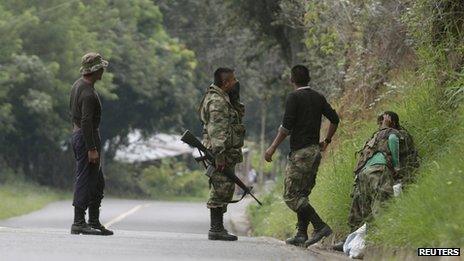Colombian peace talks resume in Cuba
- Published

While the negotiations resume in Havana, Cuba, Farc rebels continue fighting the security forces in the mountains of Colombia
Members of Colombia's largest rebel group, the Farc, have resumed peace negotiations with representatives of the Colombian government.
The talks restarted in Havana, Cuba, on Tuesday, a fortnight after the two sides reached agreement on land reform.
They are discussing how the Farc will join in politics if a deal is reached to end the five decades of conflict.
Colombian President Juan Manuel Santos has said he wants the talks to be wrapped up by the end of the year.
On 26 May, negotiators announced that after half a year of talks, they had struck a deal on agrarian reform, the first of six issues on their agenda.
'Quite confident'
On Tuesday, the the two sides started discussing how the rebels can lay down arms and become a political force.
The government's lead negotiator, Humberto de la Calle, said that this phase would focus on "establishing rules which will allow the transition of the Farc to an unarmed political force".
The rebels are expected to argue that Colombia's political system, currently dominated by two major parties, would make it hard for them to get elected.
Rebel negotiator Andres Paris told Colombian newspaper El Espectador that they would demand "a broadening of the political scene for the opposition".
"We have fought for a democratic opening and confronted Colombia's restricted two-party system," he said.
But the prospect of Farc members running for office - possibly as early as the 2015 regional elections - is strongly opposed by some sectors of Colombian society.
The president of the Colombian Federation of Cattle Ranchers, Jose Felix Lafaurie, said such a move would be unconstitutional.
"The constitution says that no-one who has been sentenced can be elected."
Many senior Farc members have been sentenced in absentia to long prison terms for rebellion and other crimes, including kidnapping, extortion and murder.
Their capture orders have been temporarily lifted to allow them to participate in the talks.
President Santos said on Friday he was "quite confident" a peace deal could be reached by the end of 2013.
"The guerrillas don't have an alternative. It's now or never," he said.
Hundreds of thousands of people have been killed since the conflict began in the 1960s, with some three million more internally displaced by the fighting.
The Farc is thought to have some 8,000 fighters, down from about 16,000 in 2001.
Last year, the guerrillas renounced kidnapping for ransom, a policy which had made Colombia one of the countries with the highest kidnapping rate in the world, with 3,500 people seized in 2000 alone.
The Farc says it is committed to the peace process although it accused Mr Santos last week of deflating the good atmosphere at the talks by meeting Venezuelan opposition leader Henrique Capriles.
Venezuela is one of the facilitator countries at the talks and had threatened to pull out of its role after what it said was Mr Santos's "provocative meeting" with the opposition leader, who has refused to recognise his defeat in April's election.
- Published27 May 2013
- Published9 April 2013